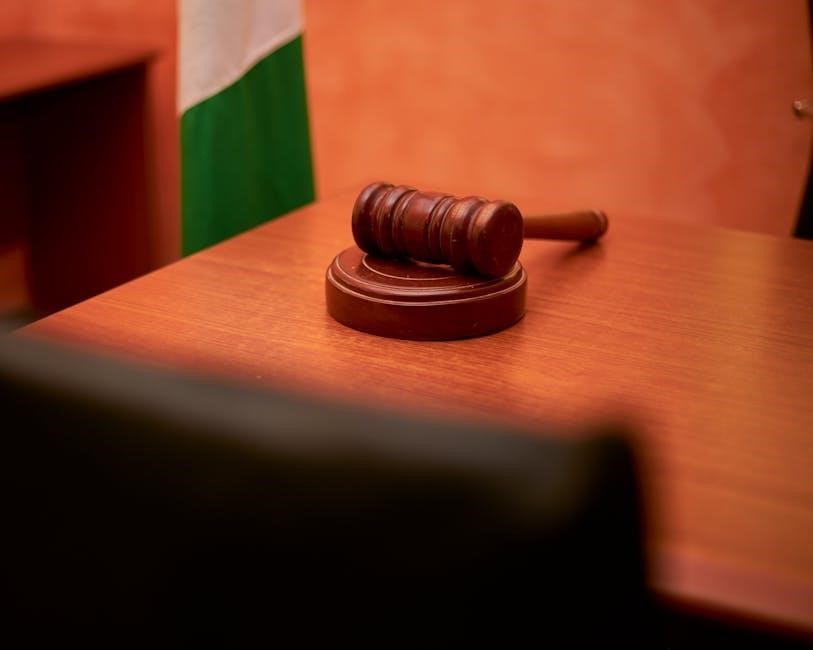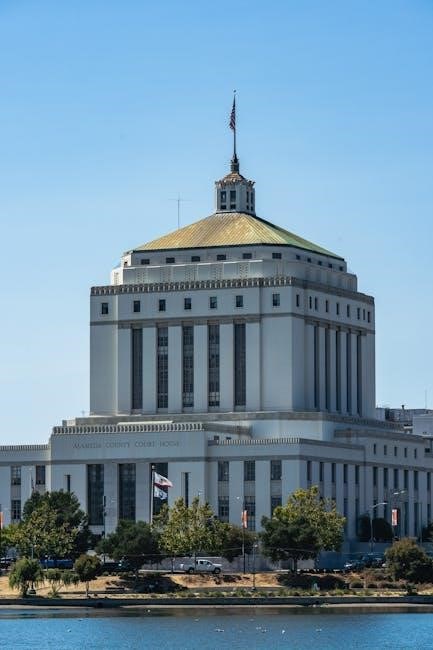William H. Pryor Jr. is a distinguished jurist serving as Chief Circuit Judge on the U.S. Court of Appeals for the Eleventh Circuit since 2005. Born on April 26, 1962, in Mobile, Alabama, he is renowned for his originalist judicial philosophy and advocacy for public safety. Pryor’s leadership and contributions to constitutional interpretation have significantly impacted American jurisprudence.
1;1 Background and Early Career
William H. Pryor Jr. was born on April 26, 1962, in Mobile, Alabama. He graduated from the University of Alabama and later earned his law degree from Tulane University. Pryor began his legal career as a law clerk for Judge John C. Godbold of the U.S. Court of Appeals for the Fifth Circuit. He then served as Alabama’s Attorney General from 1997 to 2004, advocating for public safety and constitutional integrity. His early career laid the foundation for his judicial philosophy, which emphasizes originalism and judicial modesty. Pryor’s leadership in Alabama and his commitment to legal principles garnered national attention, leading to his eventual appointment to the federal bench.
1.2 Appointment to the Eleventh Circuit
William H. Pryor Jr. was appointed to the U.S. Court of Appeals for the Eleventh Circuit on June 10, 2005, by President George W. Bush. His nomination was notable for his strong background in constitutional law and public safety advocacy. Prior to his appointment, Pryor served as Alabama’s Attorney General from 1997 to 2004, where he championed originalist legal principles. His appointment to the Eleventh Circuit, which covers Alabama, Florida, and Georgia, marked a significant step in his judicial career. Pryor’s expertise in constitutional interpretation and his commitment to judicial modesty quickly established him as a respected voice on the bench. His work on the court has particularly addressed issues of federal jurisdiction and the application of international law in domestic cases.
1.3 Role as Chief Circuit Judge
William H. Pryor Jr. has served as the Chief Circuit Judge of the U.S. Court of Appeals for the Eleventh Circuit since 2013, demonstrating exceptional leadership and judicial acumen. In this role, he oversees the administration of the court, ensuring efficiency and fairness in the adjudication of cases. Pryor has been instrumental in shaping the court’s approach to complex legal issues, particularly in matters involving constitutional interpretation and federal jurisdiction. His writings, such as “Foreign and International Law Sources in Domestic Constitutional Interpretation,” highlight his thoughtful engagement with the intersection of international and domestic law. As Chief Judge, Pryor has emphasized the importance of judicial modesty and originalism, guiding the court toward decisions that align with these principles.

Judicial Philosophy and Contributions
William H. Pryor Jr. is a staunch advocate of originalism, emphasizing the importance of interpreting the Constitution according to its original meaning. As a Chief Circuit Judge, he has championed judicial modesty, advocating for courts to avoid overstepping their authority. His contributions include influential writings on the role of international law in domestic jurisprudence, while maintaining a commitment to public safety and constitutional integrity.
2.1 Originalism in Constitutional Interpretation
William H. Pryor Jr. is a prominent advocate of originalism, a judicial philosophy that emphasizes interpreting the Constitution according to its original meaning at the time of its enactment. He believes that judges should strictly adhere to the text and avoid imposing personal policy preferences or modern societal norms. Pryor has consistently applied this approach in his rulings, often limiting judicial discretion and emphasizing the importance of textual analysis. His originalist perspective has been influential in shaping decisions on constitutional issues, particularly in cases involving federal power and individual rights. Pryor’s commitment to originalism reflects his broader philosophy of judicial restraint and respect for the Constitution’s historical framework.
2.2 Advocacy for Public Safety and Judicial Modesty

William H. Pryor Jr. has consistently emphasized the importance of judicial modesty and public safety in his rulings. He advocates for a restrained judicial approach, arguing that courts should not overstep their authority by imposing personal views or policy preferences. Pryor believes in deference to elected officials on matters of public safety, particularly in cases involving national security and law enforcement. His decisions often reflect a commitment to upholding the rule of law while ensuring that judicial power remains limited. This philosophy aligns with his broader vision of judicial restraint, where the judiciary avoids interfering with democratic processes and legislative decisions aimed at protecting societal interests. His approach has been influential in shaping legal frameworks that prioritize public safety while maintaining constitutional boundaries.
2.3 The Great Writ and Federal Courts
William H. Pryor Jr. has extensively addressed the significance of the Great Writ, or habeas corpus, in U.S. constitutional law. He emphasizes its historical role as a safeguard against unlawful detention, asserting that federal courts must carefully balance individual liberties with national security concerns. Pryor has authored key opinions on habeas corpus, particularly in cases involving immigration and terrorism, advocating for judicial restraint. He argues that courts should not expand habeas rights beyond constitutional and statutory limits, as this risks undermining democratic accountability. Pryor’s approach reflects his originalist philosophy, prioritizing the original meaning of the Constitution while ensuring the judiciary remains within its proper bounds. His rulings in this area have significantly shaped federal court applications of the Great Writ.

International Law and Its Domestic Application
William H. Pryor Jr. has critically examined the role of international law in U.S. jurisprudence, emphasizing the primacy of the Constitution and domestic legal frameworks.
3.1 Foreign and International Law Sources in Domestic Constitutional Interpretation
William H. Pryor Jr. has been a vocal skeptic of incorporating foreign and international law into domestic constitutional interpretation, arguing that such sources often undermine U.S. sovereignty and democratic governance.
He contends that the U.S. Constitution, as the supreme law of the land, should not be influenced by external legal frameworks that may reflect fundamentally different values and legal traditions.
Pryor has emphasized the importance of interpreting the Constitution based on its original meaning and historical context, rather than relying on foreign precedents or international treaties.
This view aligns with his broader judicial philosophy of originalism and textualism, which prioritizes domestic legal principles over external influences.
His opinions and writings highlight the potential risks of judicial overreach when international law is invoked in U.S. courts, advocating for a more restrained approach to constitutional adjudication.
3.2 The Role of International Law in U.S. Judicial Decisions
William H. Pryor Jr. has expressed significant skepticism regarding the role of international law in shaping U.S. judicial decisions, arguing that it often conflicts with domestic legal principles and democratic accountability.
He believes that international law should not be used to interpret the U.S. Constitution or federal statutes, as it may undermine the sovereignty of the United States and the will of its people.
Pryor has criticized the practice of citing foreign legal materials in Supreme Court opinions, asserting that such references are non-binding and lack democratic legitimacy in the U.S. legal system.
He advocates for a textualist and originalist approach, emphasizing that U.S. judges should rely on the Constitution and domestic legal precedents rather than international norms.
This viewpoint reflects his broader commitment to judicial restraint and the primacy of U.S. law over external influences.
3.3 Critique of International Law Integration into U.S. Jurisprudence
William H; Pryor Jr. has been a vocal critic of the integration of international law into U.S. jurisprudence, arguing that it undermines democratic accountability and the sovereignty of the United States.
He contends that international law, often shaped by foreign governments and global institutions, lacks the democratic legitimacy to influence U.S. court decisions, which should be grounded in the Constitution and domestic legal traditions.
Pryor emphasizes that U.S. judges should not rely on international norms or treaties to interpret domestic laws, as this could lead to judicial overreach and erode the principle of separation of powers.
He also warns that such integration risks creating legal uncertainty and inconsistency, as international law often lacks the clarity and specificity of U.S. legal standards.
Pryor advocates for a strict separation between international and domestic legal systems to preserve the integrity and autonomy of U.S. courts.

Notable Cases and Rulings
William H. Pryor Jr. has presided over significant cases involving international law, particularly in matters of treaty interpretation and federal jurisdiction.
4.1 Landmark Decisions on Constitutional Issues
William H; Pryor Jr. has delivered notable rulings on constitutional matters, particularly in cases involving federalism, religious liberty, and executive authority. In Alabama v. North Carolina, he upheld the Eleventh Amendment’s sovereign immunity protections, reinforcing states’ rights. Pryor also ruled in Avery v. City of Talladega, affirming First Amendment protections for religious speech in public spaces. His decisions often reflect a strict constructionist approach, prioritizing textualism over broader interpretations. Pryor’s rulings on the Fourth Amendment have balanced individual privacy rights with public safety concerns, showcasing his commitment to judicial restraint. These cases highlight his influence on constitutional jurisprudence and his consistent adherence to originalist principles.
4.2 Cases Involving International Law and Treaty Interpretation
William H. Pryor Jr. has addressed significant cases involving international law, particularly in extradition and treaty interpretation matters. In In re Extradition of Tudela, he upheld the supremacy of federal treaties over state laws, aligning with international extradition agreements. Pryor has also ruled on cases involving the Vienna Convention on Consular Relations, emphasizing the balance between international obligations and domestic legal frameworks. His decisions reflect a cautious approach to applying international law, prioritizing U.S. sovereignty and constitutional principles. Pryor’s rulings in these cases demonstrate his commitment to textualism and the limited role of foreign law in domestic jurisprudence, consistent with his originalist judicial philosophy.
4.3 Significant Rulings on Judicial Modesty and Originalism
William H. Pryor Jr. has consistently applied judicial modesty and originalism in his rulings, emphasizing the importance of interpreting the Constitution as written. In a notable case involving the Environmental Protection Agency (EPA), Pryor dissented from a decision that he believed overstepped judicial authority, arguing that courts should not expand agency powers beyond congressional intent. His originalist approach was evident in cases where he strictly interpreted statutory text, rejecting arguments based on broader societal implications. Pryor has also ruled on cases involving punitive damages, advocating for judicial restraint and adherence to legal precedent. His decisions reflect a commitment to limiting judicial overreach, aligning with his philosophy of textualism and constitutional fidelity.

Influence on Legal Academia and Scholarship
William H. Pryor Jr. has significantly influenced legal academia through his publications, lectures, and mentorship, shaping scholarly discourse on originalism and judicial philosophy.
5.1 Publications and Academic Contributions
William H. Pryor Jr. has made significant academic contributions through his writings on judicial philosophy, originalism, and the role of international law in U.S. jurisprudence. His works often emphasize the importance of interpreting the Constitution as written, while critically examining the integration of foreign legal precedents into domestic decisions. Pryor has authored numerous articles and essays published in prestigious legal journals, addressing topics such as the limitations of judicial authority and the dangers of over-reliance on international law. His scholarly work has been widely cited and has influenced debates among legal academics about the proper scope of judicial discretion. Pryor’s publications reflect his commitment to originalist principles and his skepticism toward expansive interpretations of international legal norms in U.S. courts.
5.2 Lectures and Speeches on Judicial Philosophy
William H. Pryor Jr. has delivered numerous lectures and speeches on judicial philosophy, focusing on originalism and the role of judges in interpreting the Constitution. His talks often emphasize the importance of judicial modesty and the dangers of judicial activism. Pryor has spoken at law schools, conferences, and events hosted by organizations like the Federalist Society, where he has advocated for a restrained approach to judging. He has also addressed the relationship between international law and domestic jurisprudence, cautioning against the over-reliance on foreign legal precedents. His speeches provide valuable insights into his legal worldview and have contributed to ongoing debates about the proper role of judges in a constitutional republic.
5.3 Mentorship and Impact on Young Legal Scholars
William H. Pryor Jr. has been a significant mentor to young legal scholars, fostering a deep understanding of constitutional law and judicial philosophy. Through his work on the U.S. Court of Appeals for the Eleventh Circuit, he has guided numerous law clerks, many of whom have gone on to prominent roles in academia and the judiciary. Pryor’s mentorship emphasizes the importance of originalism and judicial modesty, encouraging scholars to approach legal issues with a rigorous, text-based methodology. His influence extends beyond the courtroom, as he frequently engages with law students and young attorneys through lectures and writings, shaping the next generation of legal thinkers.

Leadership Roles and Professional Affiliations
William H. Pryor Jr. holds prominent roles in legal organizations, including membership in the Federalist Society, and actively participates in judicial conferences, influencing legal discourse nationwide.

6.1 Membership in the Federalist Society
William H. Pryor Jr. is a long-standing member of the Federalist Society, a prominent organization advocating for constitutional originalism and limited government. His affiliation reflects his commitment to these principles, which align with the society’s mission. Pryor has been an active participant, contributing to scholarly discussions and delivering lectures at Federalist Society events. His involvement underscores his influence in shaping conservative legal thought, particularly on issues related to judicial restraint and federalism. Pryor’s membership has also provided a platform for him to advocate for originalist interpretations of the Constitution, further cementing his reputation as a leading voice in this intellectual movement. His contributions to the society continue to resonate in legal academia and judicial circles.
6.2 Involvement in Judicial Conferences and Seminars
William H. Pryor Jr. has been an active participant in numerous judicial conferences and seminars, where he engages in discussions on critical legal issues. These events provide a platform for judges, scholars, and practitioners to exchange ideas and address emerging challenges in jurisprudence. Pryor frequently speaks on topics related to constitutional interpretation, judicial modesty, and the role of international law in domestic courts. His involvement in these forums underscores his commitment to fostering dialogue and collaboration within the legal community. By sharing his insights, Pryor contributes to the development of a more cohesive and informed judiciary, particularly in navigating the complexities of international law’s application in U.S. legal frameworks. His participation enhances the understanding of these issues among attendees.
6.3 Collaboration with Other Prominent Legal Figures
William H. Pryor Jr. has collaborated with numerous prominent legal figures, fostering a network of intellectual exchange within the judiciary and academia. His work with scholars and judges has enriched discussions on constitutional interpretation and international law. Pryor has engaged with figures such as Justice Antonin Scalia and Justice Clarence Thomas, sharing insights on originalism and judicial philosophy. He has also worked alongside leading legal academics, contributing to symposia and publications that explore the intersection of domestic and international law. These collaborations highlight Pryor’s commitment to fostering a cohesive legal community and advancing the understanding of complex jurisprudential issues.

Legacy and Impact on the Judiciary
William H. Pryor Jr.’s legacy underscores his significant influence on shaping judicial practices and promoting originalist interpretations, leaving an enduring impact on the judiciary’s approach to international law integration.
7.1 Contributions to the Development of Originalist Jurisprudence
William H. Pryor Jr. has been a steadfast advocate for originalist jurisprudence, emphasizing the importance of interpreting the Constitution as it was originally understood. His rulings and writings consistently reflect a commitment to textualism, ensuring that judicial decisions align with the intent of the Founding Fathers. Pryor’s approach has significantly influenced the judiciary, particularly in cases involving international law, where he has argued for a cautious integration of foreign legal principles. His originalist perspective has shaped key decisions, reinforcing the primacy of domestic constitutional norms. Through his work, Pryor has left an indelible mark on the development of originalist legal theory, inspiring a generation of judges and scholars to adhere to a strict constructionist interpretation of the law.

7.2 Influence on Future Generations of Judges and Lawyers
William H. Pryor Jr. has significantly influenced future generations of judges and lawyers through his mentorship and advocacy for originalist principles. His speeches, writings, and judicial decisions have inspired young legal professionals to embrace a textualist approach to constitutional interpretation. Pryor’s involvement in legal academia, including lectures at prominent law schools, has shaped the perspectives of aspiring jurists. His emphasis on judicial modesty and the rule of law has encouraged a new wave of lawyers and judges to prioritize fidelity to the Constitution. By fostering a deeper understanding of originalism, Pryor has left a lasting legacy that continues to guide legal scholarship and practice.
7.3 Criticism and Controversies Surrounding His Tenure
William H. Pryor Jr.’s judicial career has not been without criticism and controversy. His nomination to the Eleventh Circuit was initially blocked due to concerns over his views on civil rights and federalism. Critics argue that his originalist approach often leads to narrow interpretations of constitutional rights, particularly in cases involving civil liberties. Pryor has also faced scrutiny for his rulings on issues like LGBTQ+ rights and environmental regulations, with some accusing him of prioritizing judicial philosophy over public interest. Additionally, his skepticism toward the influence of international law in U.S. courts has drawn criticism from legal scholars who believe it limits the judiciary’s ability to adapt to global legal standards. These criticisms have sparked ongoing debates about his judicial legacy.
William H. Pryor Jr. has left a significant mark on U.S. jurisprudence, shaping originalist interpretations and influencing international law’s role in domestic courts. His legacy endures.
8.1 Summary of Key Contributions
William H. Pryor Jr. has made significant contributions to U.S. jurisprudence, advocating for originalism and judicial modesty. He has critically shaped the application of international law in domestic courts, emphasizing the primacy of U.S. constitutional principles. Pryor’s rulings have addressed the role of foreign law in treaty interpretation and constitutional cases, influencing debates on sovereignty and legal integration. His academic writings and speeches have furthered discussions on judicial philosophy, while his mentorship has impacted emerging legal scholars. Pryor’s legacy reflects a commitment to upholding constitutional integrity and balancing international legal influences with domestic judicial priorities.
8.2 Future Implications of His Work in International Law
William H. Pryor Jr.’s work on international law’s role in U.S. jurisprudence has significant future implications. His critiques of incorporating foreign law into domestic decisions may inspire a more cautious approach among future judges, emphasizing U.S. constitutional sovereignty. Pryor’s advocacy for judicial modesty could shape how courts balance international legal norms with domestic priorities. His influence may also encourage scholars to reassess the limits of international law in U.S. courts, potentially leading to a more isolationist judicial philosophy. This could impact treaty interpretations and cross-border legal disputes, reinforcing the primacy of U.S. law while fostering debates on global legal integration.
8.3 Final Thoughts on His Judicial Legacy
William H. Pryor Jr.’s judicial legacy is defined by his unwavering commitment to originalism and judicial modesty. His critiques of international law’s influence on U.S. jurisprudence have sparked significant debates about the role of foreign legal norms in domestic courts. Pryor’s work has left a lasting impact on how judges approach constitutional interpretation, emphasizing the primacy of U.S. law. His contributions to legal academia and his mentorship of young scholars ensure his ideas will endure. While his views on international law have drawn criticism, they have also fostered a deeper examination of sovereignty and judicial philosophy. Pryor’s legacy underscores the importance of balancing tradition with global legal realities.

